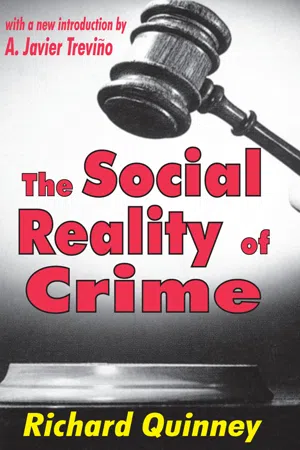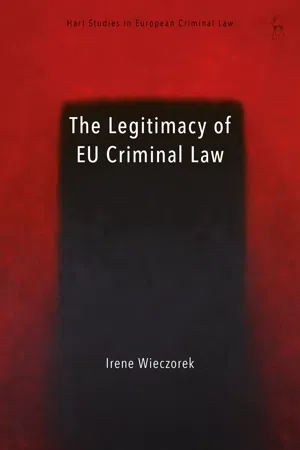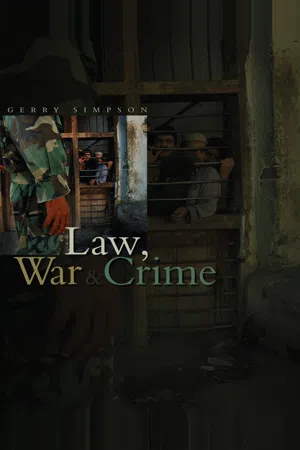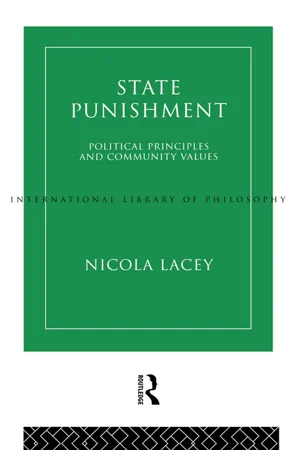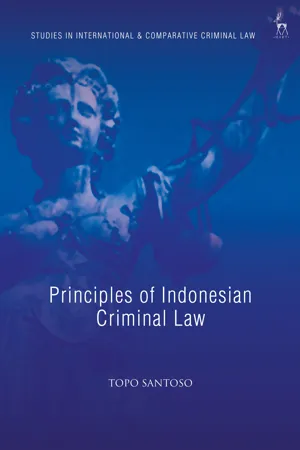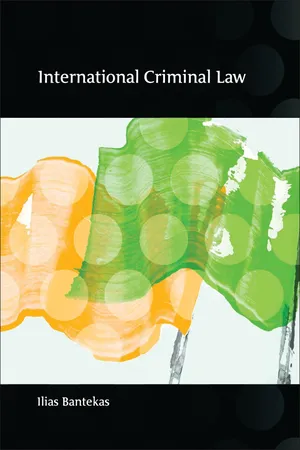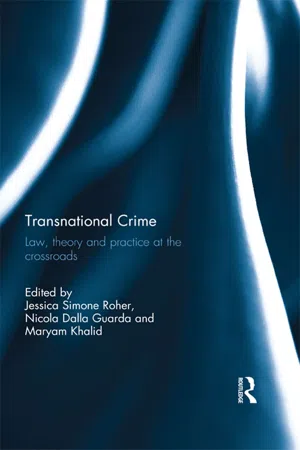Politics & International Relations
Criminal Law
Criminal law refers to the body of laws that deal with conduct considered harmful to society. It encompasses the prosecution and punishment of individuals who have committed crimes, such as theft, assault, or murder. Criminal law also outlines the legal procedures and rights of the accused, as well as the penalties for different offenses.
Written by Perlego with AI-assistance
Related key terms
7 Key excerpts on "Criminal Law"
- eBook - ePub
- Wilhelm Roepke(Author)
- 2017(Publication Date)
- Routledge(Publisher)
American Political Science Review, 61 (March, 1967), pp. 5-24.28 Charles A. Reich, “The New Property,” Yale Law Journal, 73 (April, 1964), p. 733.Passage contains an image
CHAPTER THREEInterests inthe Formulationof Criminal LawsThe perspective on Criminal Law in politically organized society provides the basis for understanding how particular Criminal Laws are formulated. Following this perspective, Criminal Laws — including the enactments of legislatures, court decisions, and administrative rulings — are formulated by those segments of society which have the power to shape public policy. The formulation of Criminal Law is thus an act of politics: Public policy is established by some for governing the lives and affairs of all inhabitants of a society. Crime, then, is a definition of human conduct that is created in the course of the political life of the community.Lawmaking, according to this perspective, represents the translation of specific group interests into public policy. For the most part, Criminal Laws support particular interests to the neglect or negation of other interests, thus representing the concerns of only some members of society. Though some Criminal Laws may involve a compromise of conflicting interests, more likely than not, Criminal Laws mark the victory of some groups over others. The notion of a compromise of conflicting interests is a myth perpetuated by a pluralistic model of politics. Some interests never find access to the lawmaking process. Other interests are overwhelmed in it, not compromised. But ultimately some interests succeed in becoming Criminal Law, and are able to control the conduct of others.EMERGENCE OF Criminal LawThe very emergence of Criminal Law is historically a political phenomenon. Because of the interests of particular social segments, Criminal Law was created: it has continued to operate in various social contexts for the benefit of diverse and shifting interests, including the interests of the state itself. - eBook - ePub
- Irene Wieczorek(Author)
- 2020(Publication Date)
- Hart Publishing(Publisher)
The accuracy of this definition, more recently re-proposed by Lipman and Molan, 11 can be debated. Due to the different influence of religion on state law, homosexuality is still a crime, in some cases subject to the death penalty in other parts of the world, 12 whereas same-sex marriage is being progressively legalised in a large number of Western countries. Similarly, differences in corporate culture explain why the US only criminalised insider trading late in the twentieth century when this practice was criminalised much earlier in other corporate cultures. 13 Remarkably, a uniform definition of rape, an intuitively harmful behaviour, is lacking even in rather culturally homogeneous contexts like the EU. 14 It appears that the countours of Criminal Law are to a large extent historically and geographically contingent, depending on the government in power. 15 Still, a number of forms of harmful conduct which one can intuitively recognise as crimes, such as theft and assault, are traditionally found in the vast majority of criminal codes. Interestingly, Interpol has been functioning for almost a century with a scope of application defined with reference to ‘ordinary crimes’. 16 This is arguably evidence of a certain international consensus on what is a crime. In fact, Criminal Law scholarship has oscillated over time between formal and content-based definitions of Criminal Law, in what Horder defines as waves of reformation and counter-reformation of criminal legal theory. 17 Be that as it may, even without embracing Glanville Williams’ total rejection of a content-based understanding of Criminal Law, his definition is a precious one, in that it captures one, even if not the only, specific feature of Criminal Law: the consequences flowing from a transgression of a criminal norm are significantly different from those flowing from violations of administrative or civil norms. As the following sections will demonstrate, they have a stronger bearing on fundamental rights - eBook - ePub
Law, War and Crime
War Crimes, Trials and the Reinvention of International Law
- Gerry J. Simpson(Author)
- 2013(Publication Date)
- Polity(Publisher)
The star defendant and the Chief Prosecutor in the Milosevic case may have disagreed about the nature of the indictment or the conduct of the defence but they shared a conception of the political as something that did not belong in a war crimes trial. ‘Politics’ for Milosevic, Del Ponte and many others in the war crimes field is an abnormality or defect (Bassiouni, 1997). Ideally, the trial is a place liberated from politics and the contamination politics threatens. In the present chapter, I challenge this orthodoxy by arguing that war crimes trials are political trials. They are political not because they lack a foundation in law or because they are the crude product of political forces but because war crimes law is saturated with conversations about what it means to engage in politics or law, as well as a series of projects that seek to employ these terms in the service of various ideological preferences. War crimes trials are political trials because concepts of the political remain perpetually in play. What follows then is a discussion and dissection of the implications, associations and meaning of this insight.The idea here is to show that war crimes law is neither simply the expression of Great Power preferences nor an assembly of institutional and doctrinal tools working against those preferences. Nor is it a practice that transcends politics altogether (and, in relation to which, politics is an external spectre threatening to undo its good works).3 Instead, I argue that war crimes law is a distinctive, sometimes legitimating, sometimes dissenting, often ambiguous, presence in international political life. The rest of the book seeks to demonstrate this through an unravelling of law’s place, subjects, promise, anxieties, hegemony and origins in the midst of trials conducted in relation to breaches of war’s fundamental norms (chapters 2–5) and at the fulcrum of justifications for war and arguments against war (chapter 6). In the end, war crimes law is a place where politics happens. This politics is constituted through the set of dialectical relationships that form the subject matter of the book.But these relationships, too, can be understood through the prism of a meta-dialectic. Often, the sponsors of war crimes trials concede that the field of war crimes law is political but that this is a particularly liberal form of politics (Bass, 2000). I argue, in this chapter, that the politics of war crimes trials is a politics of compromise between a liberal cosmopolitanism with its roots in procedural justice, equality before the law and individualism, and an illiberal particularism (anti-formal, violent, sometimes chauvinistic, exceptional and collective).I begin this chapter, then, by discussing (with a view to complicating our understanding of) some conceptions and misconceptions about the relationship between law and politics in the international sphere. This is in essence a description of some instincts circulating in the field about ‘the political’. All of this then congeals into four concepts of the political (and legal) that I take to be pervasive in the work done by international Criminal Lawyers and others. Here I discuss the ways in which these concepts manifest themselves in institutional innovation and at trial, and in related commentary. With a view to illustrating some of these points, the chapter ends with a brief analysis of a recent case at the International Criminal Tribunal for the Former Yugoslavia (ICTY) involving the Kosovan leader, Ramush Haradinaj, and an excursus on the negotiations at the Rome Conference to establish an International Criminal Court (ICC). - eBook - ePub
- Nicola Lacey(Author)
- 2012(Publication Date)
- Routledge(Publisher)
All these factors may be the subject of grave disagreement and indeed political faction-fighting: those embodied in the law and political practice will change according to such factors as which group is politically dominant at any one time. To employ this conception is not to assume a wholly consensus model of society or a society of relatively static values. It is, on the other hand, to view the practice of politics and of lawmaking as an enterprise directed at establishing and enforcing a basic set of standards which, notwithstanding disagreements, apply to all members of society for as long as those standards are supported by the political institutions. It seems preferable to attempt this task, acknowledging the lack of consensus and the constant process of incremental or indeed radical change even in a relatively stable and homogeneous society, rather than to pin the conception to some actual or hypothetical past agreement. For such a vision threatens to rob present citizens of any real opportunity to shape the basis of political co-operation, whilst, in the context of the real world, where freedom of movement between societies is limited, also denying them the possibility of joining some different arrangement— even were there to be a wide range of choice among different types of political organisation. Before moving on to the lower level of generality, we must consider some further normative principles which I shall argue should underlie the conception of the Criminal Law which I have characterised. Starting out from a basic (untested and indeed untestable) assumption that some form of political organisation is necessary to the protection of the most important interests which human beings may have and indeed to the very development of human potential, one basic principle will be that the Criminal Law is justified in protecting the security and existence of the community itself - eBook - ePub
- Topo Santoso(Author)
- 2023(Publication Date)
- Hart Publishing(Publisher)
This is because Criminal Law is very closely related to the principle of legality, which includes the existence of lex scripta (Criminal Law must be written), lex certa (Criminal Law must have certainty), and lex stricta (Criminal Law must be strict). Thus, we will not discuss other sources of law, such as customs, jurisprudence, and treaties (agreements between countries). 3 Nevertheless, treaties are very important in law, including Criminal Law. Key examples are extradition treaties and agreements that provide mutual legal assistance. However, treaties between countries cannot be used to bring an alleged perpetrator to court or become the basis for imposing a sentence. Therefore, criminal provisions, according to the principle of legality, are only contained in statutory law. Thus, in the following discussion, only the statutory law will be discussed. One example of an international treaty ratified in Indonesia is the 2003 United Nations Convention Against Corruption (UNCAC), which was ratified by Indonesia through the development of Law No 7 of 2006 concerning Ratification of the 2003 United Nations Convention Against Corruption. Even though it has been ratified, there are several provisions in UNCAC that have not been included in criminal legislation in Indonesia. This is because these provisions are only recommendations, rather than obligations. This includes areas such as illicit enrichment, bribery in the private sector, and trading in influence. Crucially, the criminal provisions contained in UNCAC cannot be used in prosecution in Indonesia because there is no legal basis in the form of national criminal legislation. This is because criminal provisions contained in international treaties are not self-executing and so do not apply automatically. According to Damos Dumoli Agusman, in order to enable the implementation of a provision, implementing legislation is required - eBook - ePub
- Ilias Bantekas(Author)
- 2010(Publication Date)
- Hart Publishing(Publisher)
Part IVEnforcement of International Criminal Law
Passage contains an image
15 The Exercise of Criminal Jurisdiction
15.1 International Law Principles on Criminal Jurisdiction
Jurisdiction refers to the power asserted by States by which they seek to prescribe and enforce their municipal laws over persons and property. This power is typically employed in three forms, which correspond to the three branches of government. Hence, legislative or prescriptive jurisdiction relates to the competence to prescribe the ambit of municipal laws, judicial jurisdiction relates to the competence of courts to apply national laws and enforcement jurisdiction refers to the ability of States to enforce the fruits of their legislative or judicial labour (for example, gathering of evidence, arrest and infliction of sanctions). In this manner jurisdiction may be both civil as well as criminal. Because the very concept of jurisdiction encompasses a claim, it is important to assess whether jurisdictional claims are predicated on an entitlement under domestic or international law. Whereas some treaties provide for the exercise of criminal jurisdiction by member States, most areas of Criminal Law, particularly those relating to common crimes, are not regulated by treaties. Moreover, even where some regulation is undertaken by means of a treaty this will not typically provide an elaborate hierarchy of jurisdictional claims.1 Even if said treaties were to set out strict hierarchical rules they would be of little value to third States that may entertain a jurisdictional claim since they would be inapplicable to them. Thus, when States exercise prescriptive and judicial jurisdiction over common or international crimes they are seemingly relying on a unilateral act that is the direct product of domestic legislation. This is, nonetheless, only half the story. In actual fact, any exercise of jurisdiction on the basis of domestic law must ensure that no express rule or principle of international law is violated in the process. As a result, States generally refrain from prosecuting common crimes taking place in the territory of other nations, nor do they arrest persons on foreign territory without consent, because this would entail a violation of the non-intervention principle.2 Equally, States cannot investigate or prosecute persons covered by an applicable immunity that is granted under international law. Thus, international law is the acid test through which all claims of jurisdiction should be weighed, irrespective of their origin. Given that States enjoy almost unlimited authority over all conduct undertaken on their territory, the general abhorrence against extraterritorial enforcement jurisdiction,3 - eBook - ePub
Transnational Crime
Law, Theory and Practice at the Crossroads
- Jessica Roher, Nicola Dalla Guarda, Maryam Khalid, Jessica Roher, Nicola Guarda, Maryam Khalid(Authors)
- 2018(Publication Date)
- Routledge(Publisher)
29 The changing nature of both law and policing represents challenges to participation and deliberation in a highly dispersed, fluid and fragmented global public sphere. The study of transnational law and policing coalesce around questions concerning the law in action.In the spirit of engagement with this symposium issue on transnational Criminal Law, we focus here on the work of Neil Boister, who has given impetus to the conception of transnational law by conjoining it with a criminological issue: transnational crime.30 Establishment of a principled basis for transnational Criminal Law remains in its infancy.31 Boister has nevertheless established a view of a ‘transnational legal space’, perceptively arguing that the notion of transnational Criminal Law provides a conceptual lens through which to view a systemic whole.32 It is worth understanding that whole, he argues, not least because, when the programmatic nature of the system of transnational Criminal Law remains hidden, so do concerns for legality and human rights. To us, this project involves understanding both law and policing.Much policework is concerned with crime, and quite a bit of transnational policework is concerned with Criminal Law. For Boister, transnational Criminal Law is defined as law directed at suppressing criminal activities with actual or potential transboundary effects.33 He argues that transnational Criminal Law is a ‘system of law’ that is both the province of ‘law enforcement’ specialists and the product of an international order dominated by a few powerful states jealously guarding their interests.34 Boister raises a number of extremely important issues, such as problems of liability, jurisdiction, definitional coherence and ambiguity in the enforcement of Criminal Law in the transnational realm. He also points to the absence of clear regulation, enforcement and punishment polices as criminal justice becomes globally interconnected. He is also critical of the way transnational Criminal Law is created – in particular, the way in which legal tools are shaped by police actors, a point that we have made in our own work. The role of police officers in making domestic law has important implications for the nature of law and the practice of law enforcement in its general sense.35
Learn about this page
Index pages curate the most relevant extracts from our library of academic textbooks. They’ve been created using an in-house natural language model (NLM), each adding context and meaning to key research topics.
